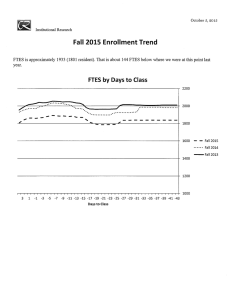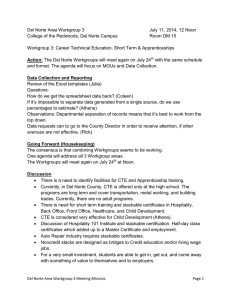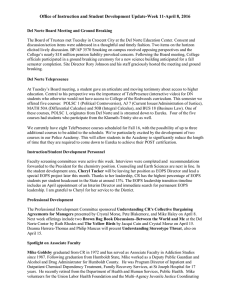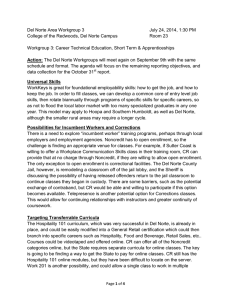Del Norte Area Workgroups 1 & 2
advertisement
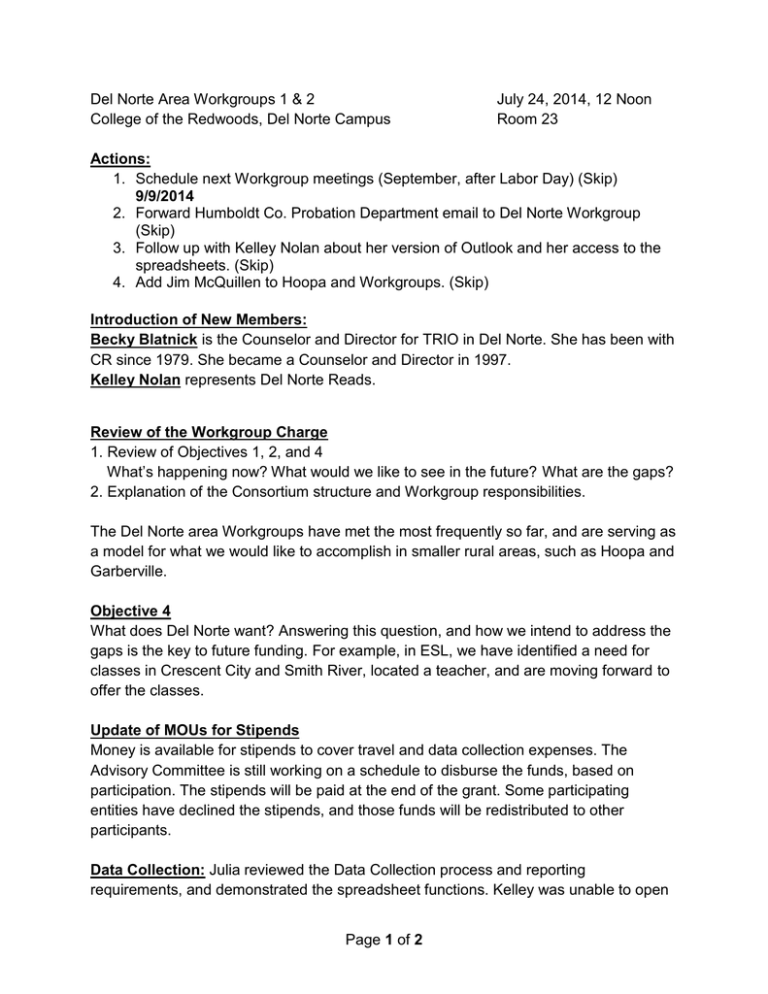
Del Norte Area Workgroups 1 & 2 College of the Redwoods, Del Norte Campus July 24, 2014, 12 Noon Room 23 Actions: 1. Schedule next Workgroup meetings (September, after Labor Day) (Skip) 9/9/2014 2. Forward Humboldt Co. Probation Department email to Del Norte Workgroup (Skip) 3. Follow up with Kelley Nolan about her version of Outlook and her access to the spreadsheets. (Skip) 4. Add Jim McQuillen to Hoopa and Workgroups. (Skip) Introduction of New Members: Becky Blatnick is the Counselor and Director for TRIO in Del Norte. She has been with CR since 1979. She became a Counselor and Director in 1997. Kelley Nolan represents Del Norte Reads. Review of the Workgroup Charge 1. Review of Objectives 1, 2, and 4 What’s happening now? What would we like to see in the future? What are the gaps? 2. Explanation of the Consortium structure and Workgroup responsibilities. The Del Norte area Workgroups have met the most frequently so far, and are serving as a model for what we would like to accomplish in smaller rural areas, such as Hoopa and Garberville. Objective 4 What does Del Norte want? Answering this question, and how we intend to address the gaps is the key to future funding. For example, in ESL, we have identified a need for classes in Crescent City and Smith River, located a teacher, and are moving forward to offer the classes. Update of MOUs for Stipends Money is available for stipends to cover travel and data collection expenses. The Advisory Committee is still working on a schedule to disburse the funds, based on participation. The stipends will be paid at the end of the grant. Some participating entities have declined the stipends, and those funds will be redistributed to other participants. Data Collection: Julia reviewed the Data Collection process and reporting requirements, and demonstrated the spreadsheet functions. Kelley was unable to open Page 1 of 2 the spreadsheets. Skip has followed up with her, and the difficulties have been resolved. Do not be concerned if your data does not fit the K-12 or Community College terminology. Please submit whatever data you have for the first report to Skip by Tuesday, July 29, 2014. You may have to estimate in some circumstances. For example, block grant funds may have been spent on multiple programs. GED classes fall under Elementary and Basic Skills. Unduplicated enrollment means counting one student as one student per chair, disregarding multiple needs, classifications, or class enrollments. Only count “Joe” once, even if he participates in more than one area. ABE funds are K-12, and FTES funds are Community College. Other participants will simply list their funding sources. Email Skip or Julia with any specific questions about your data and how to report it. Operational costs may be estimated if necessary. WIA is Title 1, and Perkins is Title 2. Please examine the spreadsheets thoroughly to determine what applies to your program or entity and call or email with any questions. We will share the data from the Humboldt Probation department as an example of what we would like to see. Discussion What educational needs could we meet to best serve our community? We know what we have. What do we need? Credit, Noncredit, Vocational, Short Term CTE? Communication is a difficulty in the Del Norte community. It’s hard to know who does what. There is currently a great deal of confusion around the GED, and new high school equivalencies. For example, until this meeting, Del Norte Reads did not have official information that CR will offer a pencil and paper HiSet, and can administer the test pretty much anywhere. The value of this Consortium is that we can bring many diverse entities with common needs and concerns together. The community seems to be focused on barriers, rather than solutions. Currently, there is an open lab for ESL in Smith River, and no other ESL is funded. Computer illiteracy is a barrier to adult learning and testing in Del Norte. The State has not yet finalized the contract on the pencil and paper HiSet, but CR hopes to offer it as soon as late September. The pencil and paper test is probably best suited to the Del Norte community. Final Thoughts 1. Local community communication can prevent duplication of services and solutions. 2. We need to educate employers and local Chambers of Commerce on the new HSEs. 3. We have an opportunity to wind up with more innovative programs and services, and not just more of the same. Page 2 of 2
